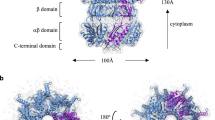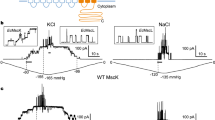Abstract
ALL cellular organisms respond to vibration, touch, gravity or changes in osmolarity, although the molecules on which such mechanosensations depend are unknown. Candidates include certain channels that gate in response to membrane stretch1,2. Patch-clamp experiments with Escherichia coli envelope have revealed a mechanosensitive channel with very large conductance (MscL) and one with a smaller conductance (MscS)3–6 which may be important in osmoregulation. Here we have solubilized and fractionated the envelope, reconstituted the MscL activity in vitro, and traced it to a small protein, whose gene, mscL, we then cloned. Insertional disruption of mscL removes the channel activity, whereas re-expression of mscL borne on an expression plasmid restores it. MscL-channel activities were observed in material from a cell-free expression system with mscL as the only template. The mscL nucleotide sequence predicts a unique protein of only 136 amino acids, with a highly hydrophobic core and very different from porins or other known proteins.
This is a preview of subscription content, access via your institution
Access options
Subscribe to this journal
Receive 51 print issues and online access
$199.00 per year
only $3.90 per issue
Buy this article
- Purchase on Springer Link
- Instant access to full article PDF
Prices may be subject to local taxes which are calculated during checkout
Similar content being viewed by others
References
Sachs, F. in Sensory-Transduction (eds Corey, P. D. & Roper, S. D.) 241–260 (Rockefeller Univ. Press, New York, 1992).
Martinac, B. in Thermodynamics of Membrane Receptors and Channels (ed. Jackson, M. B.) 327–352 (CRC, Boca Raton, 1993).
Martinac, B., Buechner, M., Delcour, A. H., Adler, J. & Kung, C. Proc. natn. Acad. Sci. U.S.A. 84, 2297–2301 (1987).
Delcour, A. H., Martinac, B., Adler, J. & Kung, C. Biophys. J. 56, 631–636 (1989).
Sukharev, S. I., Martinac, B., Arshavsky, V. Y. & Kung, C. Biophys. J. 65, 177–183 (1993).
Martinac, B., Adler, J. & Kung, C. Nature 348, 261–263 (1990).
Hamann, A., Bossemeyer, D. & Bakker, E. P. J. Bact. 169, 3138–3145 (1987).
Daniel D. L. & Blattner, F. R. Nature 325, 831–832 (1987).
Cowan, S. W. et al. Nature 358, 727–733 (1992).
Blachly-Dyson, E., Peng, S., Colombini, M. & Forte, M. Science 247, 1233–1236 (1990).
Epstein, W. FEMS Microbiol. Rev. 39, 73–78 (1986).
Britten, R. J. & McClure, F. T. Bact. Rev. 26, 292–335 (1962).
Berrier, C., Coulombe, A., Scabo, I., Zoratti, M. & Ghazi, A. Eur. J. Biochem. 206, 559–565 (1992).
Author information
Authors and Affiliations
Rights and permissions
About this article
Cite this article
Sukharev, S., Blount, P., Martinac, B. et al. A large-conductance mechanosensitive channel in E. coli encoded by mscL alone. Nature 368, 265–268 (1994). https://doi.org/10.1038/368265a0
Received:
Accepted:
Issue Date:
DOI: https://doi.org/10.1038/368265a0
This article is cited by
-
Mechanosensitive channel of large conductance enhances the mechanical stretching-induced upregulation of glycolysis and oxidative metabolism in Schwann cells
Cell Communication and Signaling (2024)
-
A mechanical-coupling mechanism in OSCA/TMEM63 channel mechanosensitivity
Nature Communications (2023)
-
Linoleic acid improves PIEZO2 dysfunction in a mouse model of Angelman Syndrome
Nature Communications (2023)
-
Ectopic expression of a mechanosensitive channel confers spatiotemporal resolution to ultrasound stimulations of neurons for visual restoration
Nature Nanotechnology (2023)
-
Asymmetric effects of amphipathic molecules on mechanosensitive channels
Scientific Reports (2022)
Comments
By submitting a comment you agree to abide by our Terms and Community Guidelines. If you find something abusive or that does not comply with our terms or guidelines please flag it as inappropriate.



